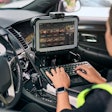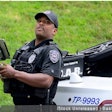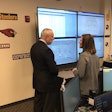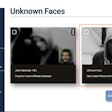Global Positioning System (GPS) tracking has been used in the law enforcement field for a long time. It was first most commonly used to track bad guys, but has since been installed in police vehicles to aid in dispatching and for officer safety monitoring.
GPS is currently being used by computer-aided dispatch (CAD) programs to recommend the closest unit when dispatching a call. Officers can also view their own location on their vehicle computer and help map out the fastest route to a call.
GPS is usually part of an on-board computer system mounted in a police vehicle, but can be a stand-alone unit. When an officer has an emergency, GPS can provide the vehicle's location, but this doesn't help if the officer isn't near the vehicle. To assist in this, GPS modules are also being included in newer models of hand-held radios and shoulder microphones.
The advantages of GPS are obvious, but several police unions have expressed a concern that GPS units could be used in Big Brother-style tactics by superior officers who will be able to track the officer's every move. Not only can GPS determine where the officer is, or isn't, but it can also determine the speed of the vehicle. Remember the time, distance, speed formula we learned in radar school?
Some agencies and unions have agreed that GPS results will not be used against officers unless a complaint has been made, but other agencies have purchased computer software that will monitor an officer's speed and print out a report. Alerts can also send out if the vehicle's speed exceeds a predetermined maximum.
I've spoken with numerous officers from several agencies. Some don't like it, but many have said that it's like having an in-car video camera installed. If you know it's there, why would you do something you're not supposed to do?














